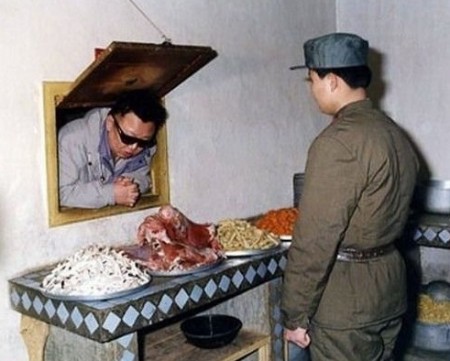
Officials from five aid agencies who have just returned from a trip to the Democratic People’s Republic of Korea (DPRK, or North Korea) say they saw evidence of looming food shortages and alarming malnutrition, including people picking wild grasses to eat. The experts visited North Korea at the request of the DPRK government and were given unprecedented access to assess the country’s food situation. Their report now shows a nation on the verge of disaster. They are therefore appealing for quick assistance to feed the isolated country’s most vulnerable people. There are hurdles, however, to resuming aid to North Korea.
The charity workers – from Christian Friends of Korea, Global Resource Services, Mercy Corps, Samaritan’s Purse and World Vision – spent a week in North Korea earlier this month. In their report, they say they visited hospitals, orphanages and homes as well as farms and warehouses. And they paint a very bleak picture. Last summer, heavy rains and flooding reduced vegetable crops by more than 50 percent, and a bitter winter has now frozen up to 50 percent of wheat and barley. Both the NGOs and the North Korean authorities estimate that food stocks will be exhausted before June.
North Korea has been suffering from food shortages due to economic mismanagement and natural disasters intermittently for the past two decades, when China and the former Soviet Union implemented hard currency payment systems that sharply reduced North Korea’s ability to import goods. The years of mismanagement thus resulted in famines during the 1990s which, according to some estimates, killed over a million people. In past years, therefore, South Korea and the US have been the primary external sources of food, either through direct food assistance or deliveries of fertilizer. But this year, with rising impatience and anger toward the North Korean regime, these reinforcements are in doubt.
For the past several months, the diplomatically isolated country has thus been going around asking most countries in the world, other than the poorest, for food aid. Yet the international community has been reluctant to renew assistance to Pyongyang after the violent incidents of last year, when North Korea was responsible for the sinking of a South Korean naval vessel in the Yellow Sea (thereby killing 46 sailors) and the shelling of a South Korean-held island along the northern limit line, which has served as the North-South border since the 1953 armistice. The North also recently revealed it had developed a new means of generating fissile material that might be used for a nuclear bomb, and talks on it disarming its nuclear programs have stalled.
Meanwhile, in the stark North Korean countryside, the regime has invested almost nothing. Unmanaged rivers regularly overflow their banks and inundate villages during typhoon season – much as they did a thousand years ago – and irrigation systems remain inadequate to confront the vicissitudes of rainfall on the often parched and barren Korean peninsula. This neglect has left North Koreans perpetually on the edge of survival. And that is where it has found itself once again. In the coming weeks and months, the international community will therefore be confronted with one of the toughest choices that any ethically minded group of people can face: Whether the short-term cost in human lives is worth the potential long-term benefits that a famine-induced collapse of North Korea could bring. A macabre reality.
For further information on Food Security in North Korea, please click here to visit our Digital Library.


2 replies on “Begging for Food”
There have been several articles in both Korean and international media questioning whether it is better to save lives in the short-term with food aid in North Korea or save more lives in the long-term by pushing North Korea to collapse and freeing the population…
It’s a tough and emotional question. Looking at the images of a hungry child can make a person leap from ideology to emotion in the blink of an eye.
Last November The Telegraph (UK) posted video by a North Korean citizen journalist – available here:
http://www.telegraph.co.uk/news/worldnews/asia/southkorea/8165274/North-Koreas-undercover-journalists-reveal-misery-of-life-in-dictatorship.html
It’s fascinating but disturbing.